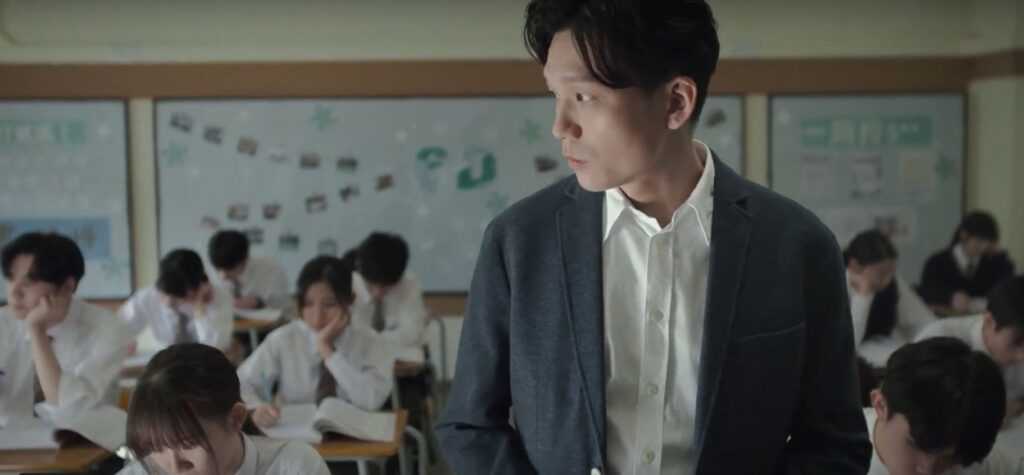January 24, 2024
by Carla Hay

Directed by Nick Cheuk
Cantonese with subtitles
Culture Representation: Taking place in Hong Kong, the dramatic film “Time Still Turns the Pages” features an all-Asian cast of characters representing the working-class and middle-class.
Culture Clash: A teacher at a high school finds out that one of his students has anonymous written a suicidal note, which prompts an investigation and triggers memories of his own unhappy childhood.
Culture Audience: “Time Still Turns the Pages” will appeal primarily to people who are interested in watching emotionally moving films about effects that depression and anxiety can have on people and the dangers of not properly treating these mental health issues.

“Time Still Turns the Pages” is a meaningful and well-acted drama about the effects of child abuse, as well as how loneliness, depression and anxiety are often mishandled or ignored. Without being too preachy, the movie has a message of being more aware and more compassionate of people who might be having these issues. Although the movie isn’t ultra-violent in showing the child abuse, some of these abuse scenes might be very disturbing to some viewers.
Written and directed by Nick Cheuk, “Time Still Turns the Pages” (which takes place in Hong Kong) begins by showing a 10-year-old boy jumping off of the roof of a high-rise building. Viewers later find out that the boy’s name is Eli Cheng (played by Sean Wong), and he is several flashback scenes that show what led him to get to this suicidal point. Did he survive or did he die? The movie answers that question.
Meanwhile, in the present day, at Lo Fuk Tong High School, a teacher named Mr. Cheng (played by Lo Chun Yip) is aware that some of his students are involved in bullying fights at the school. Near the beginning of the movie, a student named Vincent, nicknamed Van Gogh (played by Henick Chou), is shown getting reprimanded in the school principal’s office because he pushed another student down some stairs. Vincent has injuries on his face that indicate he was in a physical fight. Vincent is one of Mr. Cheng’s students.
The movie leaves it open to interpretation about who started the fight until a flashback scene later in the film reveals the full story. There are several examples of how “Time Still Turns the Pages” shows something that seems to be about one thing but reveals it’s actually about another thing. Writer/director Cheuk seamlessly weaves various timelines and story threads together in ways that are creative and poignant without being emotionally manipulative.
One day, Mr. Cheng finds out that a school janitor (played by Peter Lau) has discovered an unsigned suicidal note in Mr. Cheng’s classroom. The note was written by a student and says things such as “I am worth nothing to anyone” and “I could be easily forgotten.” Mr. Cheng is deeply affected by this note and wants to find out who wrote it.
During a meeting with other faculty and staff members about the note, there is some debate over how to find out who wrote the note. The general consensus is that it’s a delicate matter that should be handled with discretion. When the school’s social worker Halena (played by Luna Shaw) suggests that the note is a hoax that could be plagiarism from something off of the Internet, Mr. Cheng explodes with anger and says the note is not a hoax.
Eventually, it’s decided that the a trustworthy student will be enlisted by the school officials to help with the investigation. The chosen student is a class prefect named Bethany (played by Sabrina Ng), who is later revealed to have some past emotional issues of her own. The investigation weighs heavily on Mr. Cheng because he is afraid that one of his students could commit suicide before getting any professional help or counseling to prevent the suicide.
Mr. Cheng’s emotional outburst at the faculty meeting is because he has been triggered by his own memories of an unhappy childhood. The movie has various flashbacks to showing the Cheng family, which includes his abusive father Hung Cheng (played by Ronald Cheng), who is a successful attorney; Hung’s fearful wife Heidi Cheng (played by Rosa Maria Velasco), who is a homemaker; sensitive Eli Cheng; and his overachieving brother Alan Cheng (played by Curtis Ho), who is one or two years younger than Eli. These flashbacks show that Hung verbally, emotionally and physically abuses Eli and Heidi, while Alan is considered the “golden child” of the family.
Eli frequently gets punished for not getting the academic grades that his parents expect from him. And although his mother Heidi is also a victim of Hung’s abuse, she is occasionally abusive to Eli too. She sometimes says hateful insults to Eli or slaps him hard, so that she doesn’t get punished by Hung for being too “soft” on Eli. Heidi also inflicts this cruelty out of her own self-hatred and because she’s taking a lot of her anger out on Eli. Other times, she comforts Eli and is very loving to him. It’s a realistic portrayal of an abused parent who is trapped in a miserable marriage and is conflicted about how to handle it.
During Eli’s childhood, Alan seemed to keep an emotional distance from him, as if he didn’t want to be associated with his underachiever brother. Eli found comfort in reading comic books, an activity his father despised. Eli’s favorite comic book series was called “Pirate,” and he greatly admired. Eli eventually started a secret journal to write down his innermost thoughts. He also became emotionally attached to his piano teacher Miss Chan (played by Jessica Chan), a young woman who was the only adult who was consistently kind to Eli in his home.
Mr. Cheng’s flashbacks also show that he got married to a voice actress named Sherry (played by Hanna Chan), whom he met when they were teenagers. Sherry and Mr. Cheng dated other people but reconnected later in life, fell in love with each other, and got married. This marriage was negatively affected by Mr. Cheng’s unresolved issues from his childhood and his memories of his own parents’ bad marriage. Sherry and Mr. Cheng have moments that are happy and unhappy. A turning point in their marriage happens when it comes to a decision made about family planning in their relationship.
“Time Still Turns the Pages” will take viewers on a very emotional journey in finding out more about Mr. Cheng and what happened in his family, as well as how his childhood trauma affects him in his current life. The movie takes a necessary and empathetic look at how people who show signs of anxiety and depression are often misunderstood and punished, which makes their mental health issues worse. “Time Still Turns the Pages” will make a lasting impression on viewers to be more aware of warning signs in suicidal people and to reach out and help as much as possible.
Illume Films released “Time Still Turns the Pages” in select U.S. cinemas on January 19, 2024. The movie was released in Hong Kong on November 16, 2023.


